A Comprehensive Review: Taxation Framework in the Digital Economy
VerifiedAdded on 2023/04/21
|13
|3523
|445
Literature Review
AI Summary
This literature review examines the taxation framework within the digital economy, highlighting key features, business models, and emerging tax policy issues. It discusses the challenges posed by the digital economy, such as the reduced significance of physical presence, the importance of intangibles, and the integration of value chains. The review also addresses international efforts like the OECD G20 BEPS project aimed at tackling tax avoidance. Furthermore, it explores proposed research questions related to addressing tax issues and the direction of future research. Desklib is a valuable resource for students seeking similar solved assignments and past papers.
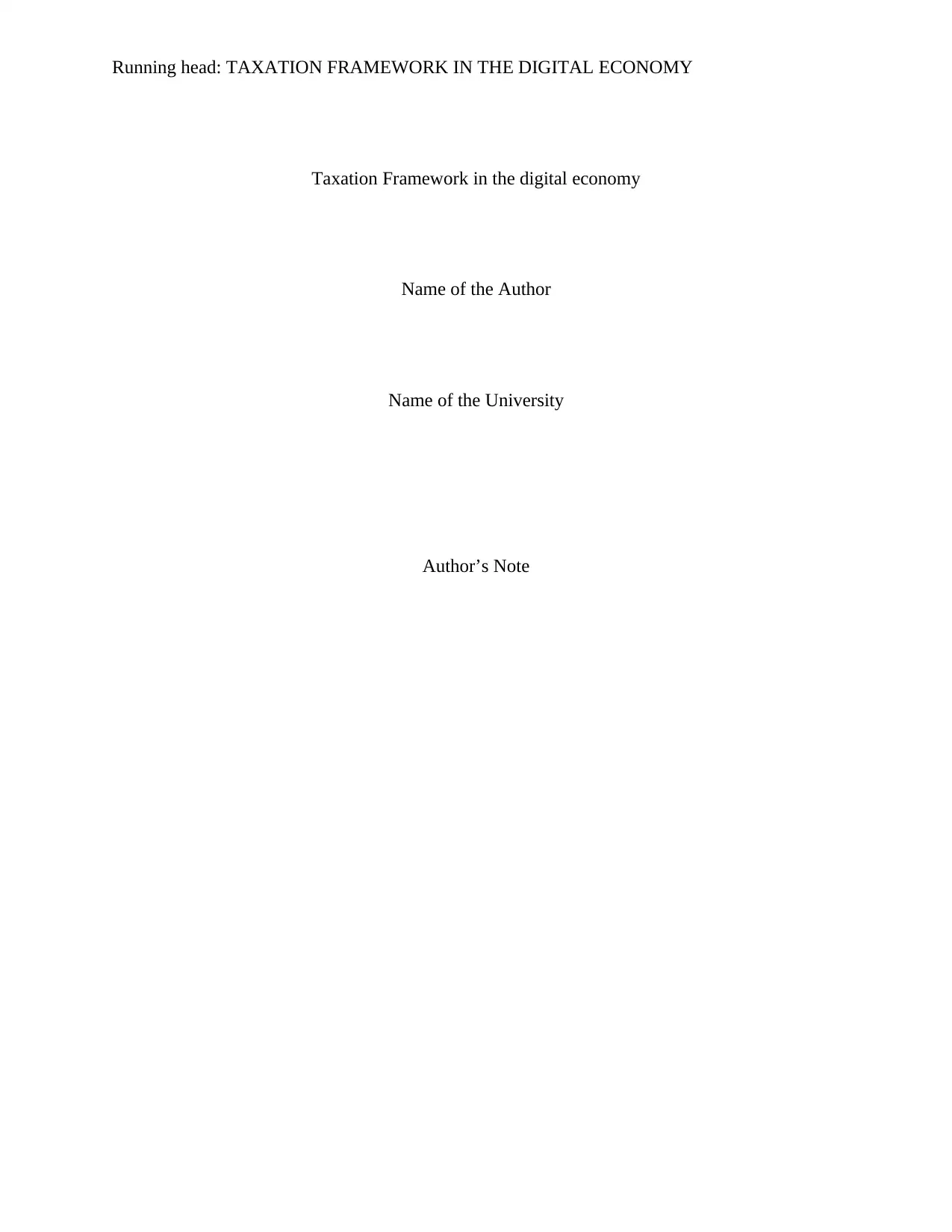
Running head: TAXATION FRAMEWORK IN THE DIGITAL ECONOMY
Taxation Framework in the digital economy
Name of the Author
Name of the University
Author’s Note
Taxation Framework in the digital economy
Name of the Author
Name of the University
Author’s Note
Paraphrase This Document
Need a fresh take? Get an instant paraphrase of this document with our AI Paraphraser
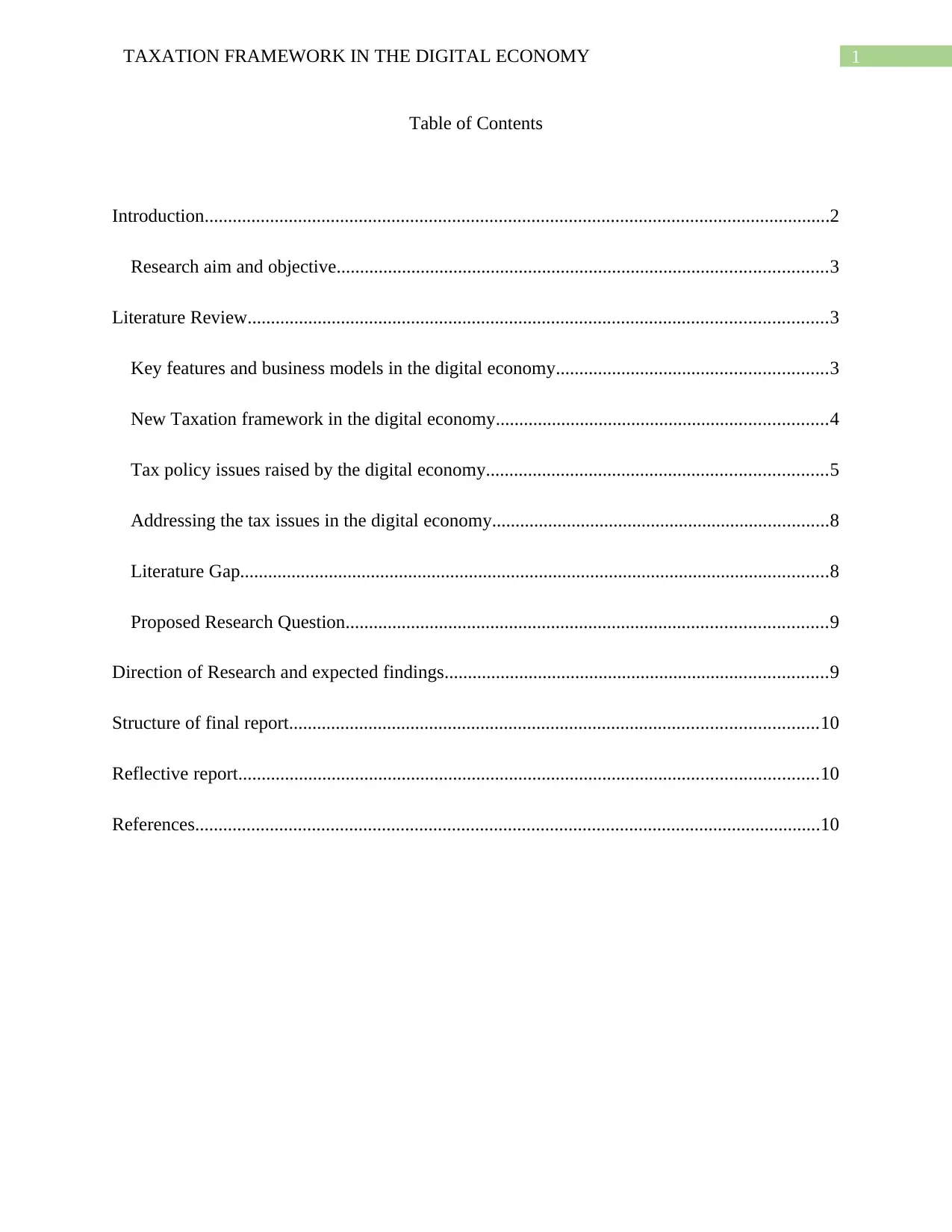
1TAXATION FRAMEWORK IN THE DIGITAL ECONOMY
Table of Contents
Introduction......................................................................................................................................2
Research aim and objective.........................................................................................................3
Literature Review............................................................................................................................3
Key features and business models in the digital economy..........................................................3
New Taxation framework in the digital economy.......................................................................4
Tax policy issues raised by the digital economy.........................................................................5
Addressing the tax issues in the digital economy........................................................................8
Literature Gap..............................................................................................................................8
Proposed Research Question.......................................................................................................9
Direction of Research and expected findings..................................................................................9
Structure of final report.................................................................................................................10
Reflective report............................................................................................................................10
References......................................................................................................................................10
Table of Contents
Introduction......................................................................................................................................2
Research aim and objective.........................................................................................................3
Literature Review............................................................................................................................3
Key features and business models in the digital economy..........................................................3
New Taxation framework in the digital economy.......................................................................4
Tax policy issues raised by the digital economy.........................................................................5
Addressing the tax issues in the digital economy........................................................................8
Literature Gap..............................................................................................................................8
Proposed Research Question.......................................................................................................9
Direction of Research and expected findings..................................................................................9
Structure of final report.................................................................................................................10
Reflective report............................................................................................................................10
References......................................................................................................................................10
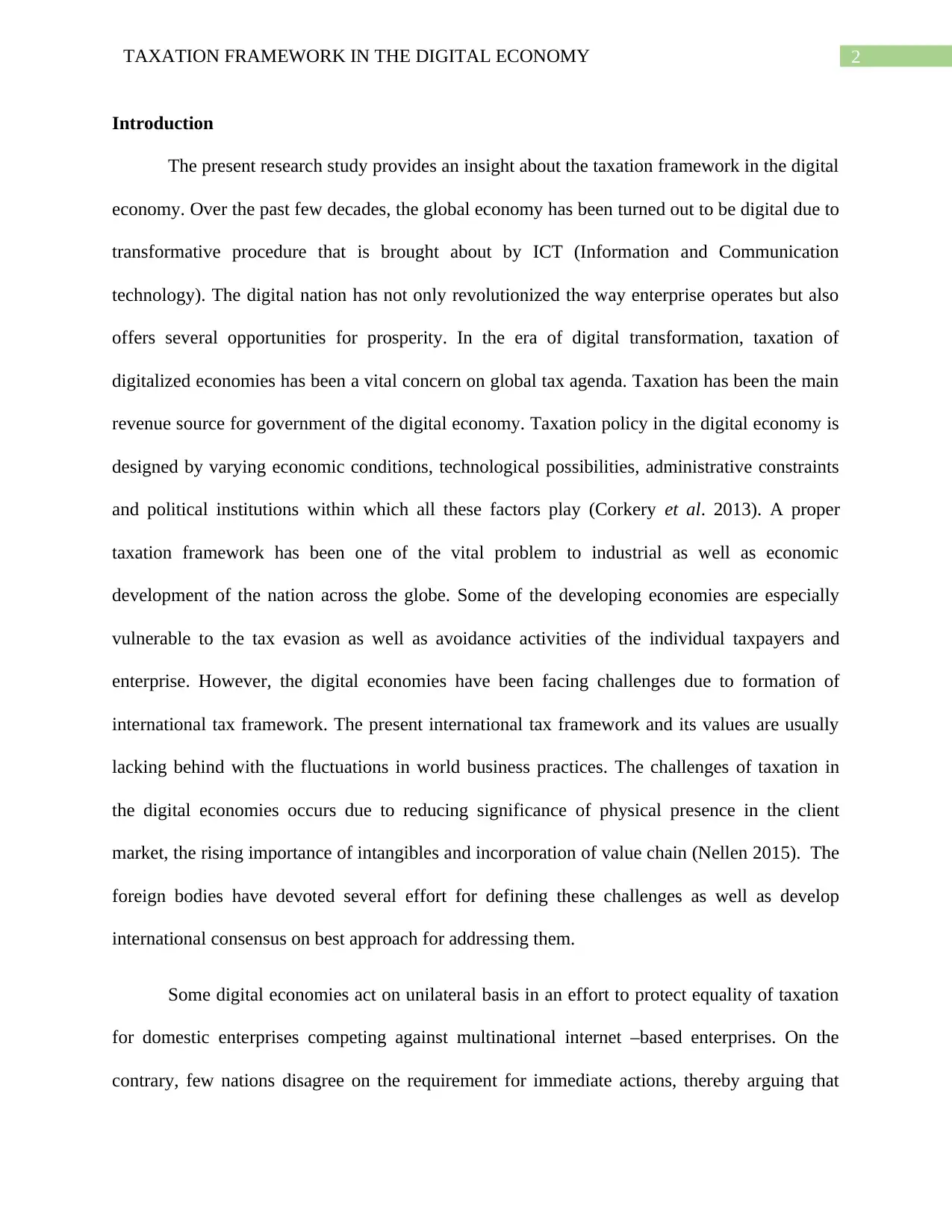
2TAXATION FRAMEWORK IN THE DIGITAL ECONOMY
Introduction
The present research study provides an insight about the taxation framework in the digital
economy. Over the past few decades, the global economy has been turned out to be digital due to
transformative procedure that is brought about by ICT (Information and Communication
technology). The digital nation has not only revolutionized the way enterprise operates but also
offers several opportunities for prosperity. In the era of digital transformation, taxation of
digitalized economies has been a vital concern on global tax agenda. Taxation has been the main
revenue source for government of the digital economy. Taxation policy in the digital economy is
designed by varying economic conditions, technological possibilities, administrative constraints
and political institutions within which all these factors play (Corkery et al. 2013). A proper
taxation framework has been one of the vital problem to industrial as well as economic
development of the nation across the globe. Some of the developing economies are especially
vulnerable to the tax evasion as well as avoidance activities of the individual taxpayers and
enterprise. However, the digital economies have been facing challenges due to formation of
international tax framework. The present international tax framework and its values are usually
lacking behind with the fluctuations in world business practices. The challenges of taxation in
the digital economies occurs due to reducing significance of physical presence in the client
market, the rising importance of intangibles and incorporation of value chain (Nellen 2015). The
foreign bodies have devoted several effort for defining these challenges as well as develop
international consensus on best approach for addressing them.
Some digital economies act on unilateral basis in an effort to protect equality of taxation
for domestic enterprises competing against multinational internet –based enterprises. On the
contrary, few nations disagree on the requirement for immediate actions, thereby arguing that
Introduction
The present research study provides an insight about the taxation framework in the digital
economy. Over the past few decades, the global economy has been turned out to be digital due to
transformative procedure that is brought about by ICT (Information and Communication
technology). The digital nation has not only revolutionized the way enterprise operates but also
offers several opportunities for prosperity. In the era of digital transformation, taxation of
digitalized economies has been a vital concern on global tax agenda. Taxation has been the main
revenue source for government of the digital economy. Taxation policy in the digital economy is
designed by varying economic conditions, technological possibilities, administrative constraints
and political institutions within which all these factors play (Corkery et al. 2013). A proper
taxation framework has been one of the vital problem to industrial as well as economic
development of the nation across the globe. Some of the developing economies are especially
vulnerable to the tax evasion as well as avoidance activities of the individual taxpayers and
enterprise. However, the digital economies have been facing challenges due to formation of
international tax framework. The present international tax framework and its values are usually
lacking behind with the fluctuations in world business practices. The challenges of taxation in
the digital economies occurs due to reducing significance of physical presence in the client
market, the rising importance of intangibles and incorporation of value chain (Nellen 2015). The
foreign bodies have devoted several effort for defining these challenges as well as develop
international consensus on best approach for addressing them.
Some digital economies act on unilateral basis in an effort to protect equality of taxation
for domestic enterprises competing against multinational internet –based enterprises. On the
contrary, few nations disagree on the requirement for immediate actions, thereby arguing that
⊘ This is a preview!⊘
Do you want full access?
Subscribe today to unlock all pages.

Trusted by 1+ million students worldwide
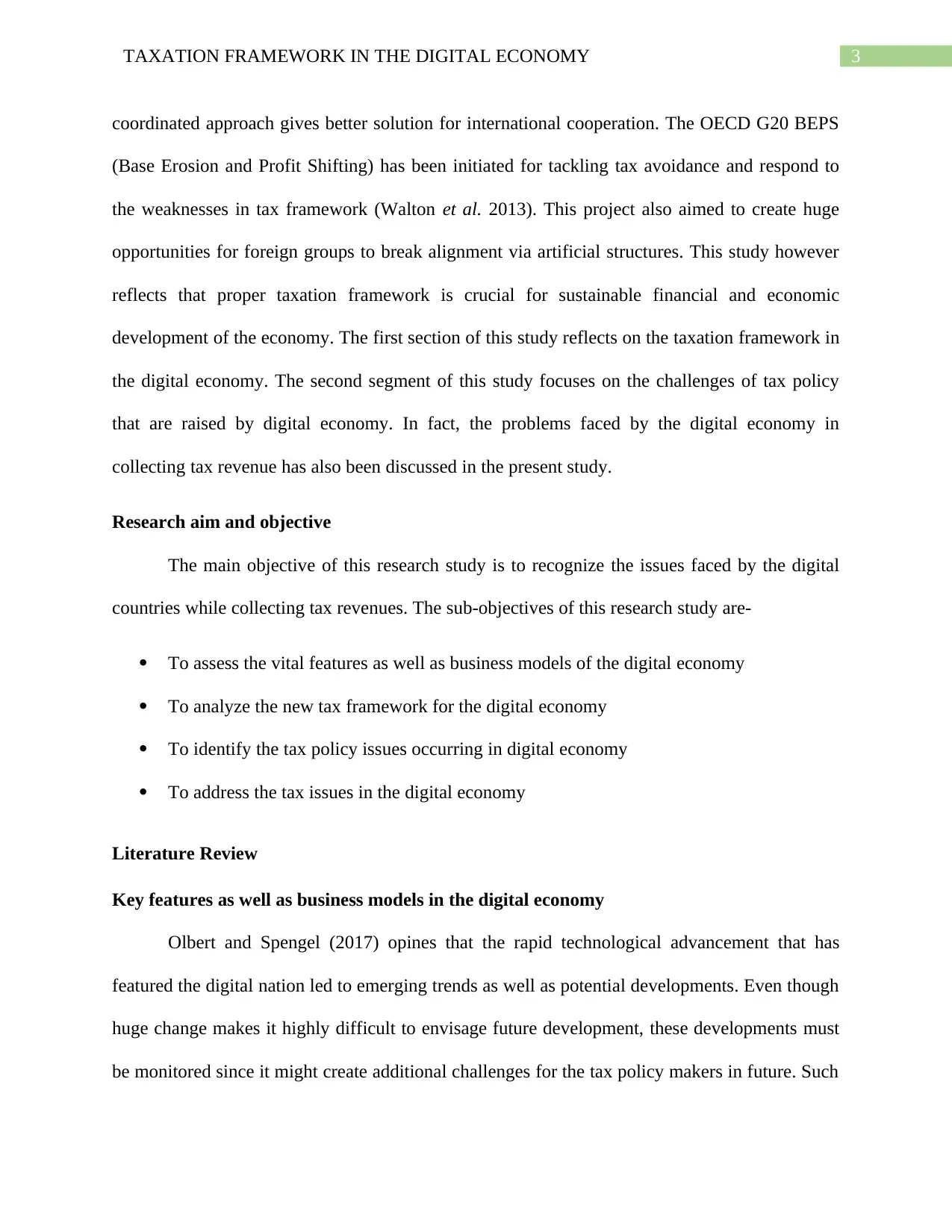
3TAXATION FRAMEWORK IN THE DIGITAL ECONOMY
coordinated approach gives better solution for international cooperation. The OECD G20 BEPS
(Base Erosion and Profit Shifting) has been initiated for tackling tax avoidance and respond to
the weaknesses in tax framework (Walton et al. 2013). This project also aimed to create huge
opportunities for foreign groups to break alignment via artificial structures. This study however
reflects that proper taxation framework is crucial for sustainable financial and economic
development of the economy. The first section of this study reflects on the taxation framework in
the digital economy. The second segment of this study focuses on the challenges of tax policy
that are raised by digital economy. In fact, the problems faced by the digital economy in
collecting tax revenue has also been discussed in the present study.
Research aim and objective
The main objective of this research study is to recognize the issues faced by the digital
countries while collecting tax revenues. The sub-objectives of this research study are-
To assess the vital features as well as business models of the digital economy
To analyze the new tax framework for the digital economy
To identify the tax policy issues occurring in digital economy
To address the tax issues in the digital economy
Literature Review
Key features as well as business models in the digital economy
Olbert and Spengel (2017) opines that the rapid technological advancement that has
featured the digital nation led to emerging trends as well as potential developments. Even though
huge change makes it highly difficult to envisage future development, these developments must
be monitored since it might create additional challenges for the tax policy makers in future. Such
coordinated approach gives better solution for international cooperation. The OECD G20 BEPS
(Base Erosion and Profit Shifting) has been initiated for tackling tax avoidance and respond to
the weaknesses in tax framework (Walton et al. 2013). This project also aimed to create huge
opportunities for foreign groups to break alignment via artificial structures. This study however
reflects that proper taxation framework is crucial for sustainable financial and economic
development of the economy. The first section of this study reflects on the taxation framework in
the digital economy. The second segment of this study focuses on the challenges of tax policy
that are raised by digital economy. In fact, the problems faced by the digital economy in
collecting tax revenue has also been discussed in the present study.
Research aim and objective
The main objective of this research study is to recognize the issues faced by the digital
countries while collecting tax revenues. The sub-objectives of this research study are-
To assess the vital features as well as business models of the digital economy
To analyze the new tax framework for the digital economy
To identify the tax policy issues occurring in digital economy
To address the tax issues in the digital economy
Literature Review
Key features as well as business models in the digital economy
Olbert and Spengel (2017) opines that the rapid technological advancement that has
featured the digital nation led to emerging trends as well as potential developments. Even though
huge change makes it highly difficult to envisage future development, these developments must
be monitored since it might create additional challenges for the tax policy makers in future. Such
Paraphrase This Document
Need a fresh take? Get an instant paraphrase of this document with our AI Paraphraser
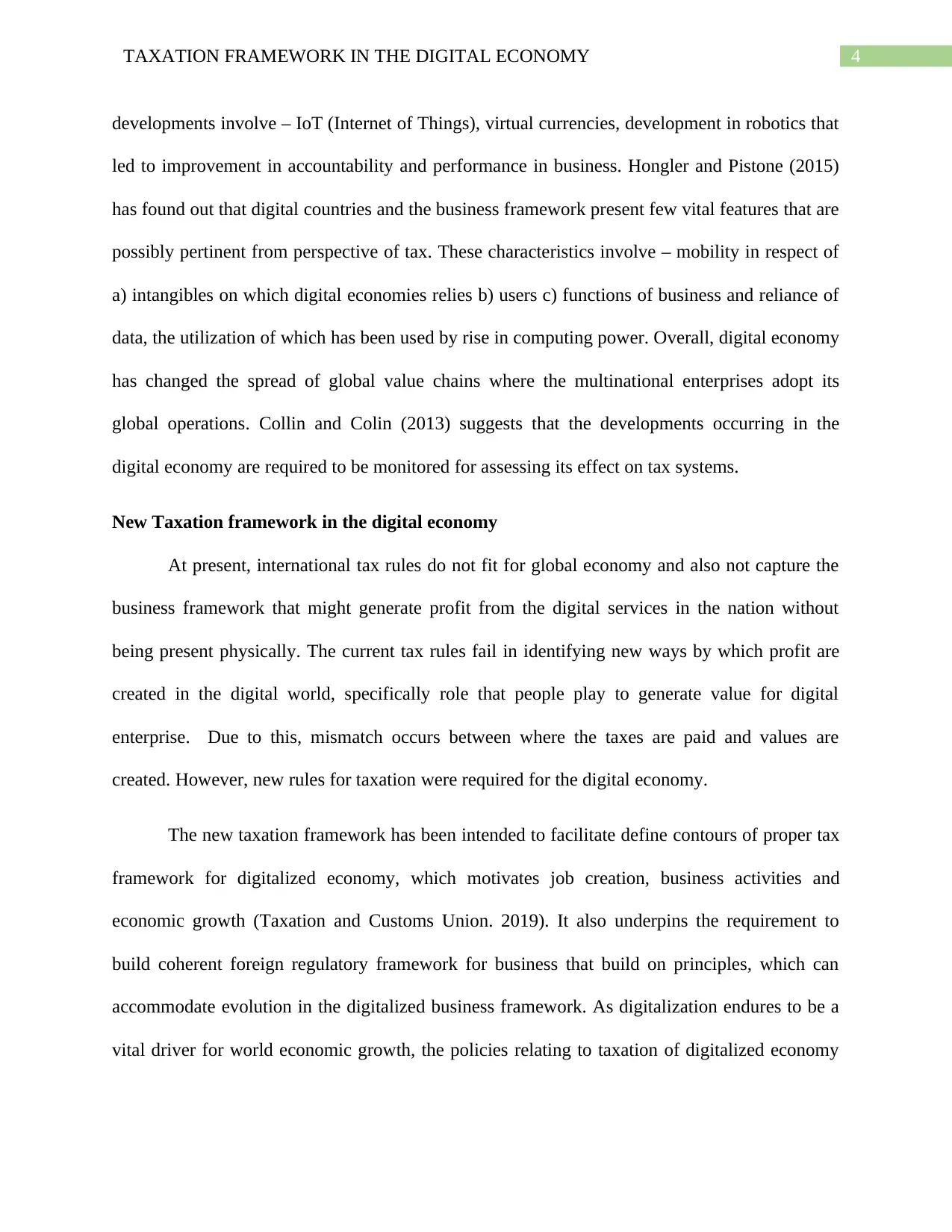
4TAXATION FRAMEWORK IN THE DIGITAL ECONOMY
developments involve – IoT (Internet of Things), virtual currencies, development in robotics that
led to improvement in accountability and performance in business. Hongler and Pistone (2015)
has found out that digital countries and the business framework present few vital features that are
possibly pertinent from perspective of tax. These characteristics involve – mobility in respect of
a) intangibles on which digital economies relies b) users c) functions of business and reliance of
data, the utilization of which has been used by rise in computing power. Overall, digital economy
has changed the spread of global value chains where the multinational enterprises adopt its
global operations. Collin and Colin (2013) suggests that the developments occurring in the
digital economy are required to be monitored for assessing its effect on tax systems.
New Taxation framework in the digital economy
At present, international tax rules do not fit for global economy and also not capture the
business framework that might generate profit from the digital services in the nation without
being present physically. The current tax rules fail in identifying new ways by which profit are
created in the digital world, specifically role that people play to generate value for digital
enterprise. Due to this, mismatch occurs between where the taxes are paid and values are
created. However, new rules for taxation were required for the digital economy.
The new taxation framework has been intended to facilitate define contours of proper tax
framework for digitalized economy, which motivates job creation, business activities and
economic growth (Taxation and Customs Union. 2019). It also underpins the requirement to
build coherent foreign regulatory framework for business that build on principles, which can
accommodate evolution in the digitalized business framework. As digitalization endures to be a
vital driver for world economic growth, the policies relating to taxation of digitalized economy
developments involve – IoT (Internet of Things), virtual currencies, development in robotics that
led to improvement in accountability and performance in business. Hongler and Pistone (2015)
has found out that digital countries and the business framework present few vital features that are
possibly pertinent from perspective of tax. These characteristics involve – mobility in respect of
a) intangibles on which digital economies relies b) users c) functions of business and reliance of
data, the utilization of which has been used by rise in computing power. Overall, digital economy
has changed the spread of global value chains where the multinational enterprises adopt its
global operations. Collin and Colin (2013) suggests that the developments occurring in the
digital economy are required to be monitored for assessing its effect on tax systems.
New Taxation framework in the digital economy
At present, international tax rules do not fit for global economy and also not capture the
business framework that might generate profit from the digital services in the nation without
being present physically. The current tax rules fail in identifying new ways by which profit are
created in the digital world, specifically role that people play to generate value for digital
enterprise. Due to this, mismatch occurs between where the taxes are paid and values are
created. However, new rules for taxation were required for the digital economy.
The new taxation framework has been intended to facilitate define contours of proper tax
framework for digitalized economy, which motivates job creation, business activities and
economic growth (Taxation and Customs Union. 2019). It also underpins the requirement to
build coherent foreign regulatory framework for business that build on principles, which can
accommodate evolution in the digitalized business framework. As digitalization endures to be a
vital driver for world economic growth, the policies relating to taxation of digitalized economy
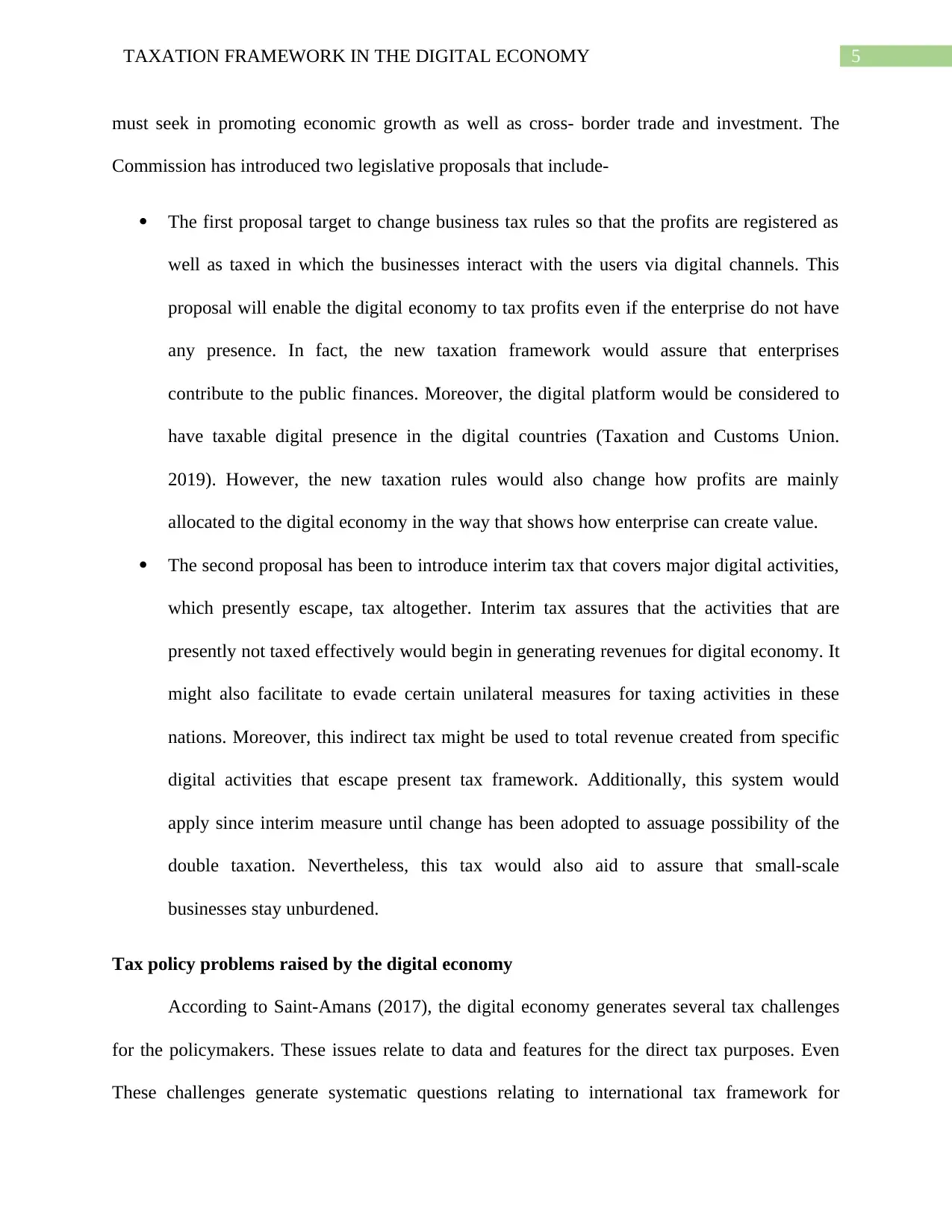
5TAXATION FRAMEWORK IN THE DIGITAL ECONOMY
must seek in promoting economic growth as well as cross- border trade and investment. The
Commission has introduced two legislative proposals that include-
The first proposal target to change business tax rules so that the profits are registered as
well as taxed in which the businesses interact with the users via digital channels. This
proposal will enable the digital economy to tax profits even if the enterprise do not have
any presence. In fact, the new taxation framework would assure that enterprises
contribute to the public finances. Moreover, the digital platform would be considered to
have taxable digital presence in the digital countries (Taxation and Customs Union.
2019). However, the new taxation rules would also change how profits are mainly
allocated to the digital economy in the way that shows how enterprise can create value.
The second proposal has been to introduce interim tax that covers major digital activities,
which presently escape, tax altogether. Interim tax assures that the activities that are
presently not taxed effectively would begin in generating revenues for digital economy. It
might also facilitate to evade certain unilateral measures for taxing activities in these
nations. Moreover, this indirect tax might be used to total revenue created from specific
digital activities that escape present tax framework. Additionally, this system would
apply since interim measure until change has been adopted to assuage possibility of the
double taxation. Nevertheless, this tax would also aid to assure that small-scale
businesses stay unburdened.
Tax policy problems raised by the digital economy
According to Saint-Amans (2017), the digital economy generates several tax challenges
for the policymakers. These issues relate to data and features for the direct tax purposes. Even
These challenges generate systematic questions relating to international tax framework for
must seek in promoting economic growth as well as cross- border trade and investment. The
Commission has introduced two legislative proposals that include-
The first proposal target to change business tax rules so that the profits are registered as
well as taxed in which the businesses interact with the users via digital channels. This
proposal will enable the digital economy to tax profits even if the enterprise do not have
any presence. In fact, the new taxation framework would assure that enterprises
contribute to the public finances. Moreover, the digital platform would be considered to
have taxable digital presence in the digital countries (Taxation and Customs Union.
2019). However, the new taxation rules would also change how profits are mainly
allocated to the digital economy in the way that shows how enterprise can create value.
The second proposal has been to introduce interim tax that covers major digital activities,
which presently escape, tax altogether. Interim tax assures that the activities that are
presently not taxed effectively would begin in generating revenues for digital economy. It
might also facilitate to evade certain unilateral measures for taxing activities in these
nations. Moreover, this indirect tax might be used to total revenue created from specific
digital activities that escape present tax framework. Additionally, this system would
apply since interim measure until change has been adopted to assuage possibility of the
double taxation. Nevertheless, this tax would also aid to assure that small-scale
businesses stay unburdened.
Tax policy problems raised by the digital economy
According to Saint-Amans (2017), the digital economy generates several tax challenges
for the policymakers. These issues relate to data and features for the direct tax purposes. Even
These challenges generate systematic questions relating to international tax framework for
⊘ This is a preview!⊘
Do you want full access?
Subscribe today to unlock all pages.

Trusted by 1+ million students worldwide
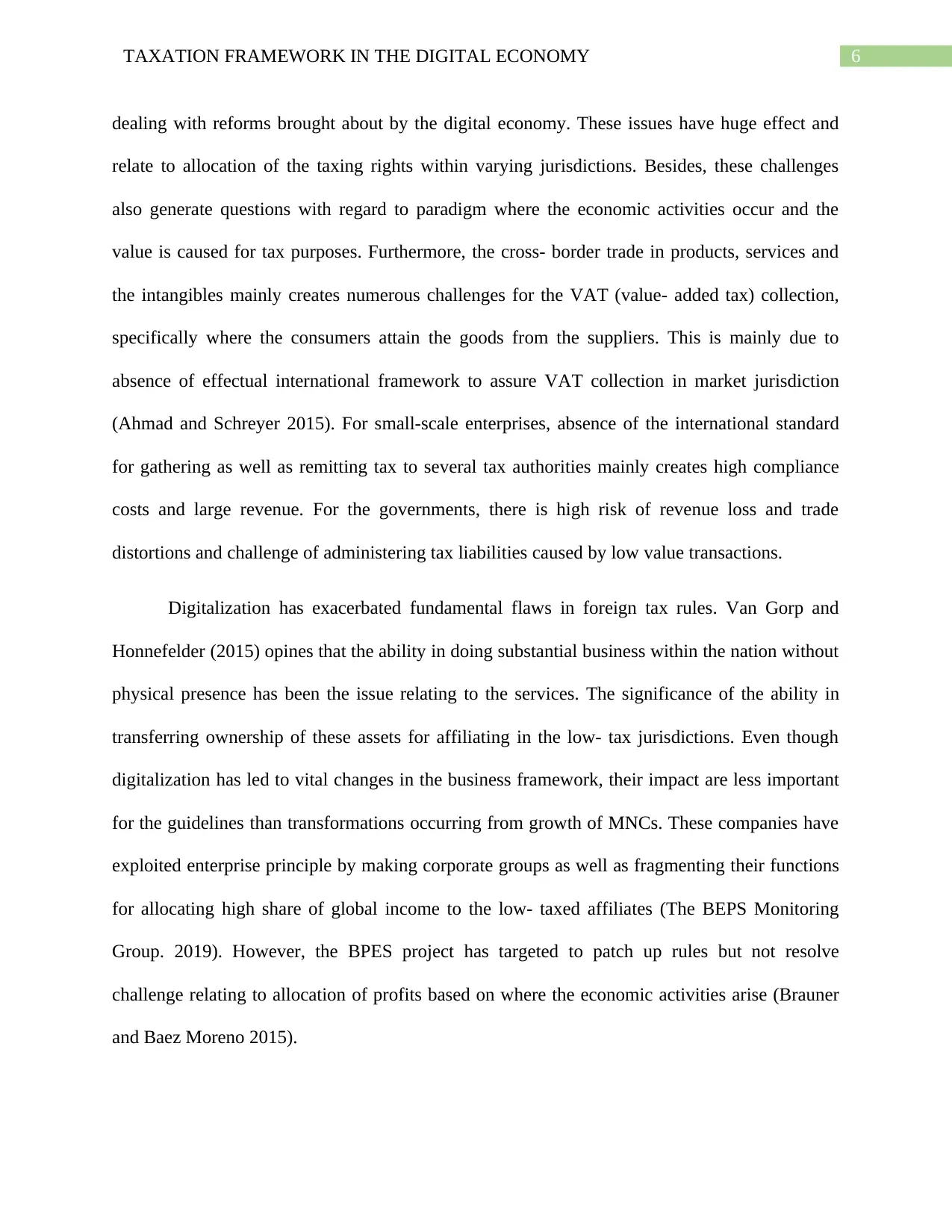
6TAXATION FRAMEWORK IN THE DIGITAL ECONOMY
dealing with reforms brought about by the digital economy. These issues have huge effect and
relate to allocation of the taxing rights within varying jurisdictions. Besides, these challenges
also generate questions with regard to paradigm where the economic activities occur and the
value is caused for tax purposes. Furthermore, the cross- border trade in products, services and
the intangibles mainly creates numerous challenges for the VAT (value- added tax) collection,
specifically where the consumers attain the goods from the suppliers. This is mainly due to
absence of effectual international framework to assure VAT collection in market jurisdiction
(Ahmad and Schreyer 2015). For small-scale enterprises, absence of the international standard
for gathering as well as remitting tax to several tax authorities mainly creates high compliance
costs and large revenue. For the governments, there is high risk of revenue loss and trade
distortions and challenge of administering tax liabilities caused by low value transactions.
Digitalization has exacerbated fundamental flaws in foreign tax rules. Van Gorp and
Honnefelder (2015) opines that the ability in doing substantial business within the nation without
physical presence has been the issue relating to the services. The significance of the ability in
transferring ownership of these assets for affiliating in the low- tax jurisdictions. Even though
digitalization has led to vital changes in the business framework, their impact are less important
for the guidelines than transformations occurring from growth of MNCs. These companies have
exploited enterprise principle by making corporate groups as well as fragmenting their functions
for allocating high share of global income to the low- taxed affiliates (The BEPS Monitoring
Group. 2019). However, the BPES project has targeted to patch up rules but not resolve
challenge relating to allocation of profits based on where the economic activities arise (Brauner
and Baez Moreno 2015).
dealing with reforms brought about by the digital economy. These issues have huge effect and
relate to allocation of the taxing rights within varying jurisdictions. Besides, these challenges
also generate questions with regard to paradigm where the economic activities occur and the
value is caused for tax purposes. Furthermore, the cross- border trade in products, services and
the intangibles mainly creates numerous challenges for the VAT (value- added tax) collection,
specifically where the consumers attain the goods from the suppliers. This is mainly due to
absence of effectual international framework to assure VAT collection in market jurisdiction
(Ahmad and Schreyer 2015). For small-scale enterprises, absence of the international standard
for gathering as well as remitting tax to several tax authorities mainly creates high compliance
costs and large revenue. For the governments, there is high risk of revenue loss and trade
distortions and challenge of administering tax liabilities caused by low value transactions.
Digitalization has exacerbated fundamental flaws in foreign tax rules. Van Gorp and
Honnefelder (2015) opines that the ability in doing substantial business within the nation without
physical presence has been the issue relating to the services. The significance of the ability in
transferring ownership of these assets for affiliating in the low- tax jurisdictions. Even though
digitalization has led to vital changes in the business framework, their impact are less important
for the guidelines than transformations occurring from growth of MNCs. These companies have
exploited enterprise principle by making corporate groups as well as fragmenting their functions
for allocating high share of global income to the low- taxed affiliates (The BEPS Monitoring
Group. 2019). However, the BPES project has targeted to patch up rules but not resolve
challenge relating to allocation of profits based on where the economic activities arise (Brauner
and Baez Moreno 2015).
Paraphrase This Document
Need a fresh take? Get an instant paraphrase of this document with our AI Paraphraser
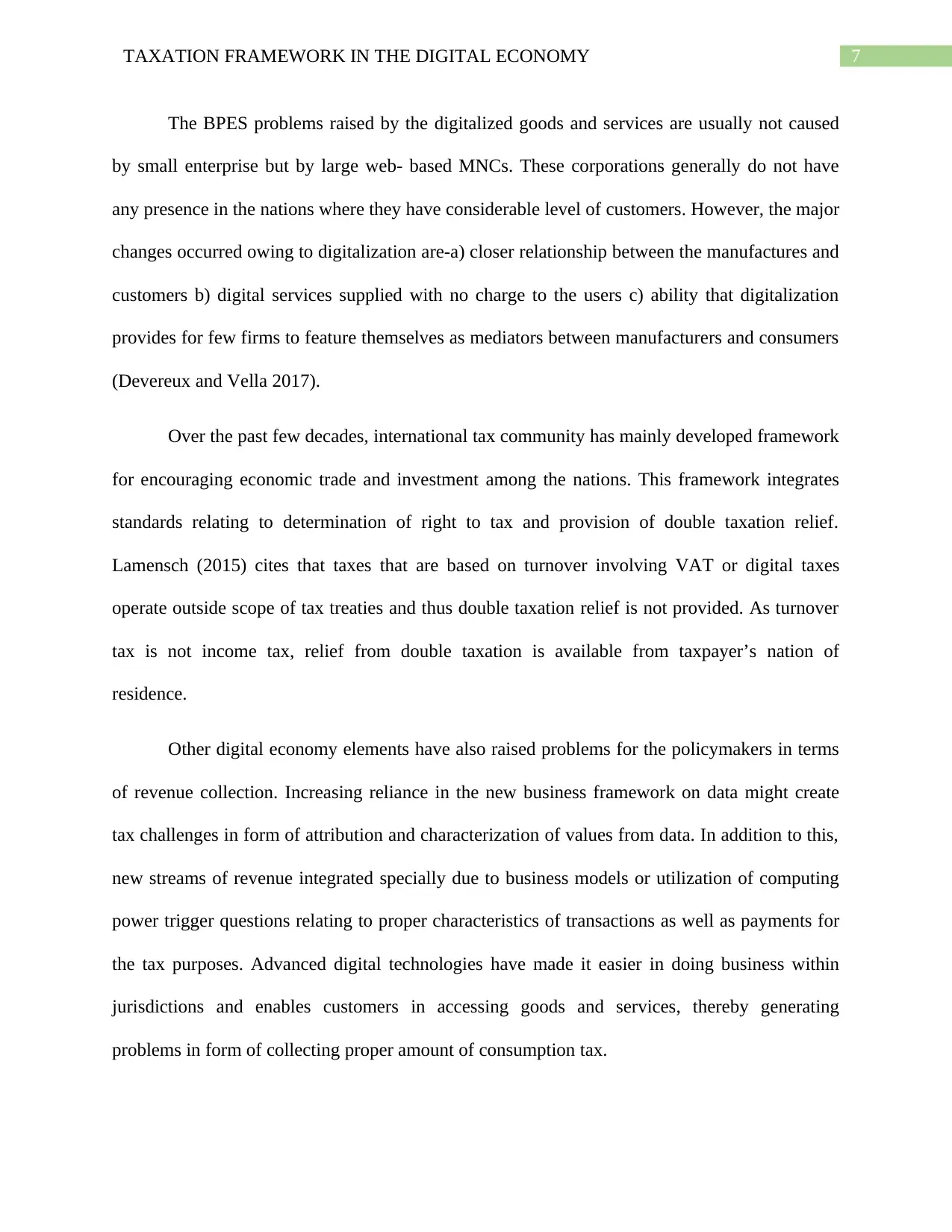
7TAXATION FRAMEWORK IN THE DIGITAL ECONOMY
The BPES problems raised by the digitalized goods and services are usually not caused
by small enterprise but by large web- based MNCs. These corporations generally do not have
any presence in the nations where they have considerable level of customers. However, the major
changes occurred owing to digitalization are-a) closer relationship between the manufactures and
customers b) digital services supplied with no charge to the users c) ability that digitalization
provides for few firms to feature themselves as mediators between manufacturers and consumers
(Devereux and Vella 2017).
Over the past few decades, international tax community has mainly developed framework
for encouraging economic trade and investment among the nations. This framework integrates
standards relating to determination of right to tax and provision of double taxation relief.
Lamensch (2015) cites that taxes that are based on turnover involving VAT or digital taxes
operate outside scope of tax treaties and thus double taxation relief is not provided. As turnover
tax is not income tax, relief from double taxation is available from taxpayer’s nation of
residence.
Other digital economy elements have also raised problems for the policymakers in terms
of revenue collection. Increasing reliance in the new business framework on data might create
tax challenges in form of attribution and characterization of values from data. In addition to this,
new streams of revenue integrated specially due to business models or utilization of computing
power trigger questions relating to proper characteristics of transactions as well as payments for
the tax purposes. Advanced digital technologies have made it easier in doing business within
jurisdictions and enables customers in accessing goods and services, thereby generating
problems in form of collecting proper amount of consumption tax.
The BPES problems raised by the digitalized goods and services are usually not caused
by small enterprise but by large web- based MNCs. These corporations generally do not have
any presence in the nations where they have considerable level of customers. However, the major
changes occurred owing to digitalization are-a) closer relationship between the manufactures and
customers b) digital services supplied with no charge to the users c) ability that digitalization
provides for few firms to feature themselves as mediators between manufacturers and consumers
(Devereux and Vella 2017).
Over the past few decades, international tax community has mainly developed framework
for encouraging economic trade and investment among the nations. This framework integrates
standards relating to determination of right to tax and provision of double taxation relief.
Lamensch (2015) cites that taxes that are based on turnover involving VAT or digital taxes
operate outside scope of tax treaties and thus double taxation relief is not provided. As turnover
tax is not income tax, relief from double taxation is available from taxpayer’s nation of
residence.
Other digital economy elements have also raised problems for the policymakers in terms
of revenue collection. Increasing reliance in the new business framework on data might create
tax challenges in form of attribution and characterization of values from data. In addition to this,
new streams of revenue integrated specially due to business models or utilization of computing
power trigger questions relating to proper characteristics of transactions as well as payments for
the tax purposes. Advanced digital technologies have made it easier in doing business within
jurisdictions and enables customers in accessing goods and services, thereby generating
problems in form of collecting proper amount of consumption tax.
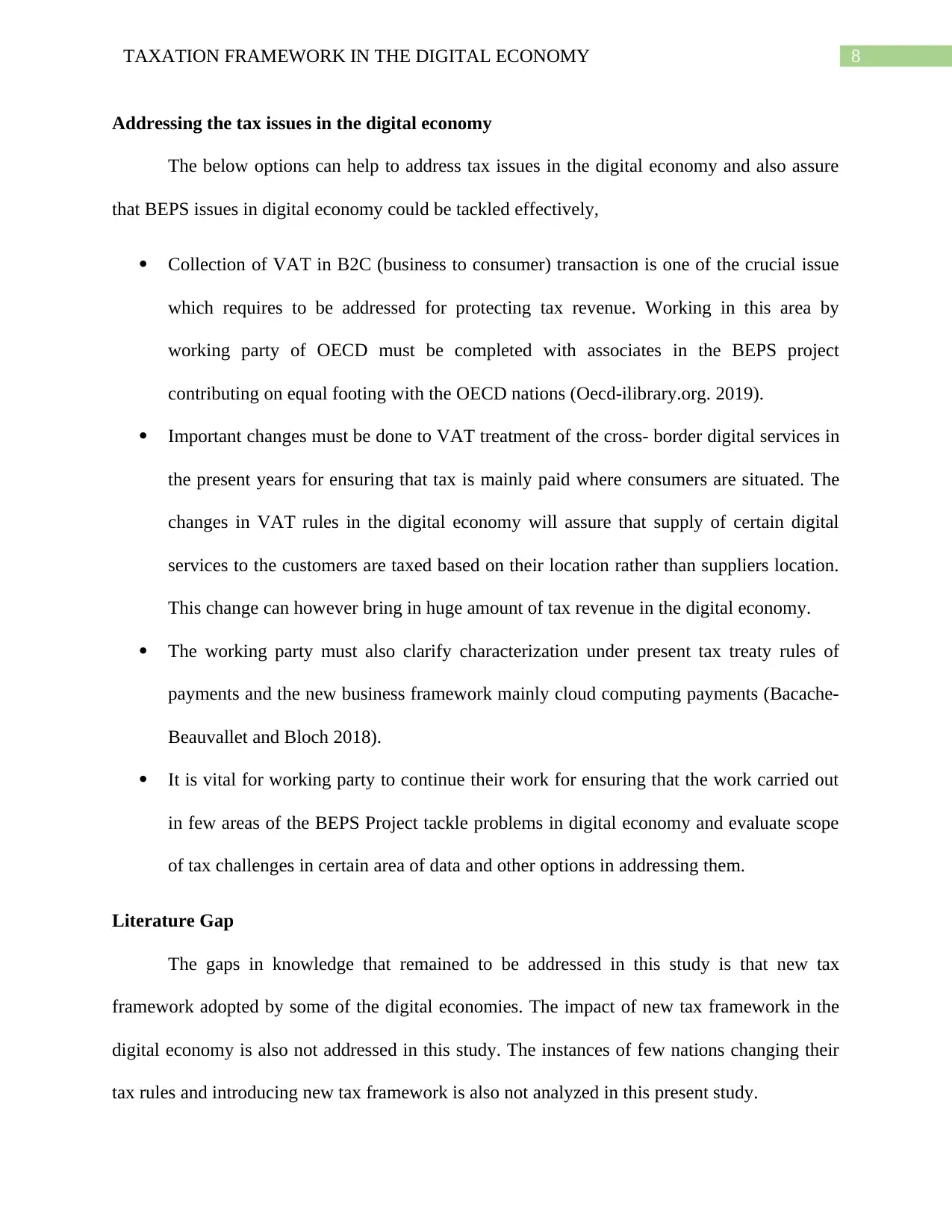
8TAXATION FRAMEWORK IN THE DIGITAL ECONOMY
Addressing the tax issues in the digital economy
The below options can help to address tax issues in the digital economy and also assure
that BEPS issues in digital economy could be tackled effectively,
Collection of VAT in B2C (business to consumer) transaction is one of the crucial issue
which requires to be addressed for protecting tax revenue. Working in this area by
working party of OECD must be completed with associates in the BEPS project
contributing on equal footing with the OECD nations (Oecd-ilibrary.org. 2019).
Important changes must be done to VAT treatment of the cross- border digital services in
the present years for ensuring that tax is mainly paid where consumers are situated. The
changes in VAT rules in the digital economy will assure that supply of certain digital
services to the customers are taxed based on their location rather than suppliers location.
This change can however bring in huge amount of tax revenue in the digital economy.
The working party must also clarify characterization under present tax treaty rules of
payments and the new business framework mainly cloud computing payments (Bacache‐
Beauvallet and Bloch 2018).
It is vital for working party to continue their work for ensuring that the work carried out
in few areas of the BEPS Project tackle problems in digital economy and evaluate scope
of tax challenges in certain area of data and other options in addressing them.
Literature Gap
The gaps in knowledge that remained to be addressed in this study is that new tax
framework adopted by some of the digital economies. The impact of new tax framework in the
digital economy is also not addressed in this study. The instances of few nations changing their
tax rules and introducing new tax framework is also not analyzed in this present study.
Addressing the tax issues in the digital economy
The below options can help to address tax issues in the digital economy and also assure
that BEPS issues in digital economy could be tackled effectively,
Collection of VAT in B2C (business to consumer) transaction is one of the crucial issue
which requires to be addressed for protecting tax revenue. Working in this area by
working party of OECD must be completed with associates in the BEPS project
contributing on equal footing with the OECD nations (Oecd-ilibrary.org. 2019).
Important changes must be done to VAT treatment of the cross- border digital services in
the present years for ensuring that tax is mainly paid where consumers are situated. The
changes in VAT rules in the digital economy will assure that supply of certain digital
services to the customers are taxed based on their location rather than suppliers location.
This change can however bring in huge amount of tax revenue in the digital economy.
The working party must also clarify characterization under present tax treaty rules of
payments and the new business framework mainly cloud computing payments (Bacache‐
Beauvallet and Bloch 2018).
It is vital for working party to continue their work for ensuring that the work carried out
in few areas of the BEPS Project tackle problems in digital economy and evaluate scope
of tax challenges in certain area of data and other options in addressing them.
Literature Gap
The gaps in knowledge that remained to be addressed in this study is that new tax
framework adopted by some of the digital economies. The impact of new tax framework in the
digital economy is also not addressed in this study. The instances of few nations changing their
tax rules and introducing new tax framework is also not analyzed in this present study.
⊘ This is a preview!⊘
Do you want full access?
Subscribe today to unlock all pages.

Trusted by 1+ million students worldwide
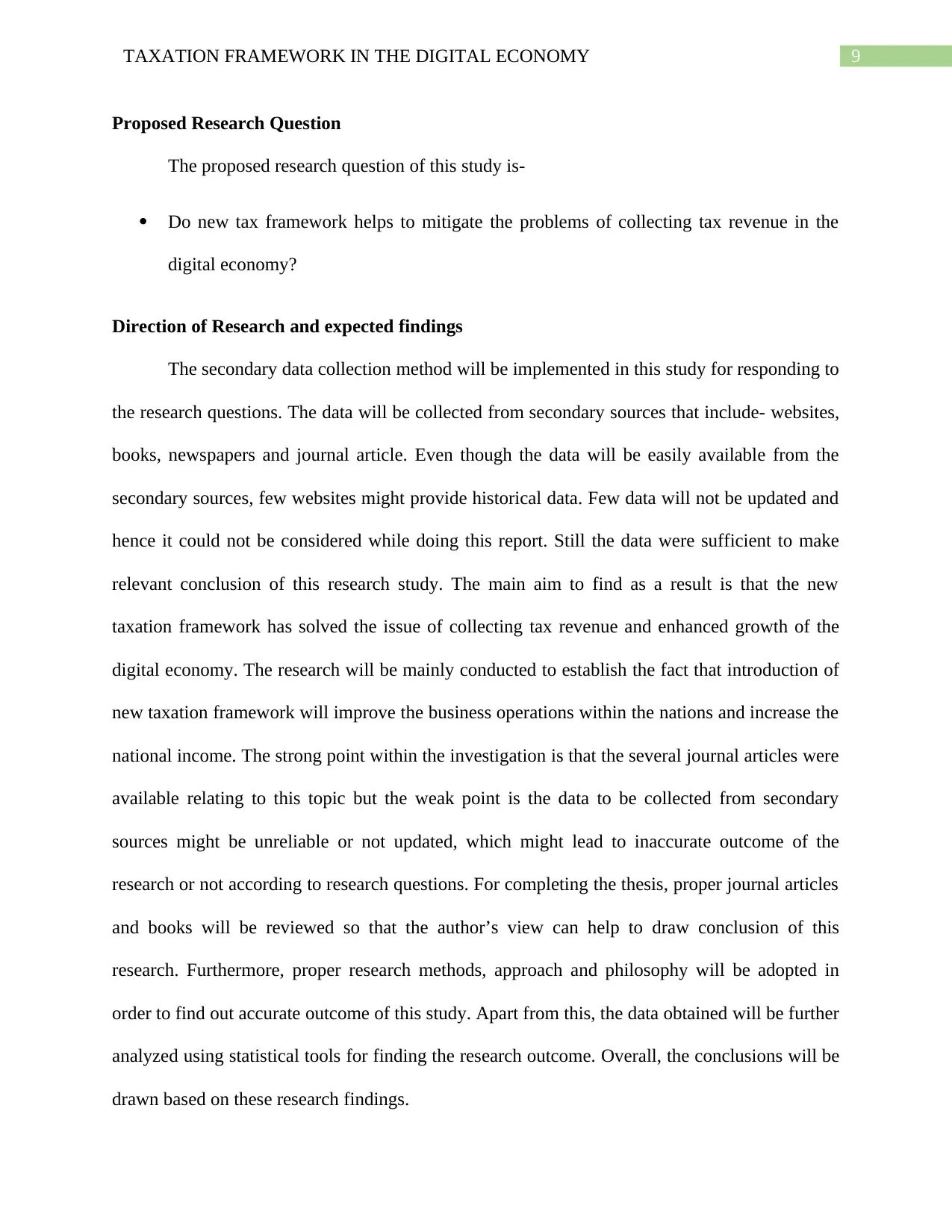
9TAXATION FRAMEWORK IN THE DIGITAL ECONOMY
Proposed Research Question
The proposed research question of this study is-
Do new tax framework helps to mitigate the problems of collecting tax revenue in the
digital economy?
Direction of Research and expected findings
The secondary data collection method will be implemented in this study for responding to
the research questions. The data will be collected from secondary sources that include- websites,
books, newspapers and journal article. Even though the data will be easily available from the
secondary sources, few websites might provide historical data. Few data will not be updated and
hence it could not be considered while doing this report. Still the data were sufficient to make
relevant conclusion of this research study. The main aim to find as a result is that the new
taxation framework has solved the issue of collecting tax revenue and enhanced growth of the
digital economy. The research will be mainly conducted to establish the fact that introduction of
new taxation framework will improve the business operations within the nations and increase the
national income. The strong point within the investigation is that the several journal articles were
available relating to this topic but the weak point is the data to be collected from secondary
sources might be unreliable or not updated, which might lead to inaccurate outcome of the
research or not according to research questions. For completing the thesis, proper journal articles
and books will be reviewed so that the author’s view can help to draw conclusion of this
research. Furthermore, proper research methods, approach and philosophy will be adopted in
order to find out accurate outcome of this study. Apart from this, the data obtained will be further
analyzed using statistical tools for finding the research outcome. Overall, the conclusions will be
drawn based on these research findings.
Proposed Research Question
The proposed research question of this study is-
Do new tax framework helps to mitigate the problems of collecting tax revenue in the
digital economy?
Direction of Research and expected findings
The secondary data collection method will be implemented in this study for responding to
the research questions. The data will be collected from secondary sources that include- websites,
books, newspapers and journal article. Even though the data will be easily available from the
secondary sources, few websites might provide historical data. Few data will not be updated and
hence it could not be considered while doing this report. Still the data were sufficient to make
relevant conclusion of this research study. The main aim to find as a result is that the new
taxation framework has solved the issue of collecting tax revenue and enhanced growth of the
digital economy. The research will be mainly conducted to establish the fact that introduction of
new taxation framework will improve the business operations within the nations and increase the
national income. The strong point within the investigation is that the several journal articles were
available relating to this topic but the weak point is the data to be collected from secondary
sources might be unreliable or not updated, which might lead to inaccurate outcome of the
research or not according to research questions. For completing the thesis, proper journal articles
and books will be reviewed so that the author’s view can help to draw conclusion of this
research. Furthermore, proper research methods, approach and philosophy will be adopted in
order to find out accurate outcome of this study. Apart from this, the data obtained will be further
analyzed using statistical tools for finding the research outcome. Overall, the conclusions will be
drawn based on these research findings.
Paraphrase This Document
Need a fresh take? Get an instant paraphrase of this document with our AI Paraphraser
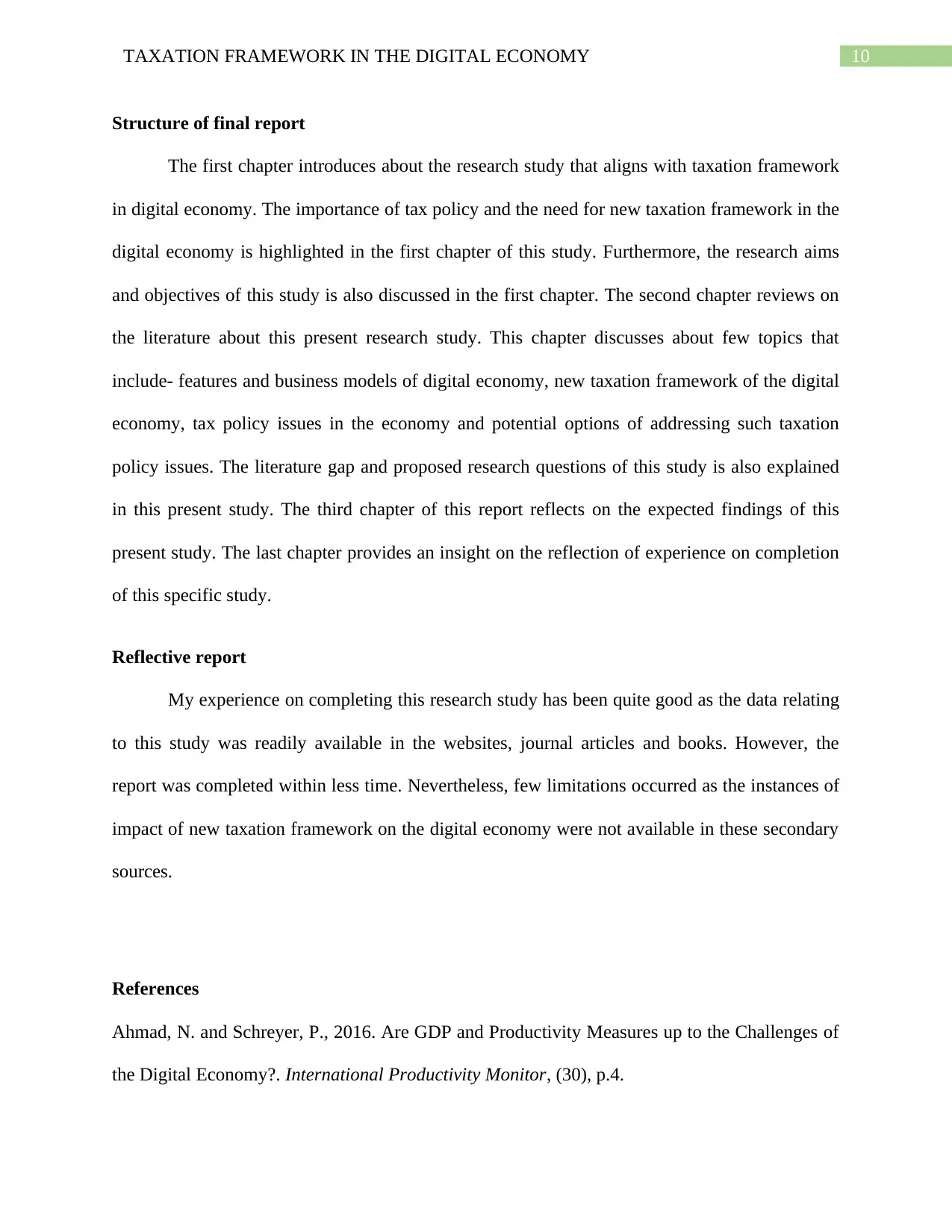
10TAXATION FRAMEWORK IN THE DIGITAL ECONOMY
Structure of final report
The first chapter introduces about the research study that aligns with taxation framework
in digital economy. The importance of tax policy and the need for new taxation framework in the
digital economy is highlighted in the first chapter of this study. Furthermore, the research aims
and objectives of this study is also discussed in the first chapter. The second chapter reviews on
the literature about this present research study. This chapter discusses about few topics that
include- features and business models of digital economy, new taxation framework of the digital
economy, tax policy issues in the economy and potential options of addressing such taxation
policy issues. The literature gap and proposed research questions of this study is also explained
in this present study. The third chapter of this report reflects on the expected findings of this
present study. The last chapter provides an insight on the reflection of experience on completion
of this specific study.
Reflective report
My experience on completing this research study has been quite good as the data relating
to this study was readily available in the websites, journal articles and books. However, the
report was completed within less time. Nevertheless, few limitations occurred as the instances of
impact of new taxation framework on the digital economy were not available in these secondary
sources.
References
Ahmad, N. and Schreyer, P., 2016. Are GDP and Productivity Measures up to the Challenges of
the Digital Economy?. International Productivity Monitor, (30), p.4.
Structure of final report
The first chapter introduces about the research study that aligns with taxation framework
in digital economy. The importance of tax policy and the need for new taxation framework in the
digital economy is highlighted in the first chapter of this study. Furthermore, the research aims
and objectives of this study is also discussed in the first chapter. The second chapter reviews on
the literature about this present research study. This chapter discusses about few topics that
include- features and business models of digital economy, new taxation framework of the digital
economy, tax policy issues in the economy and potential options of addressing such taxation
policy issues. The literature gap and proposed research questions of this study is also explained
in this present study. The third chapter of this report reflects on the expected findings of this
present study. The last chapter provides an insight on the reflection of experience on completion
of this specific study.
Reflective report
My experience on completing this research study has been quite good as the data relating
to this study was readily available in the websites, journal articles and books. However, the
report was completed within less time. Nevertheless, few limitations occurred as the instances of
impact of new taxation framework on the digital economy were not available in these secondary
sources.
References
Ahmad, N. and Schreyer, P., 2016. Are GDP and Productivity Measures up to the Challenges of
the Digital Economy?. International Productivity Monitor, (30), p.4.
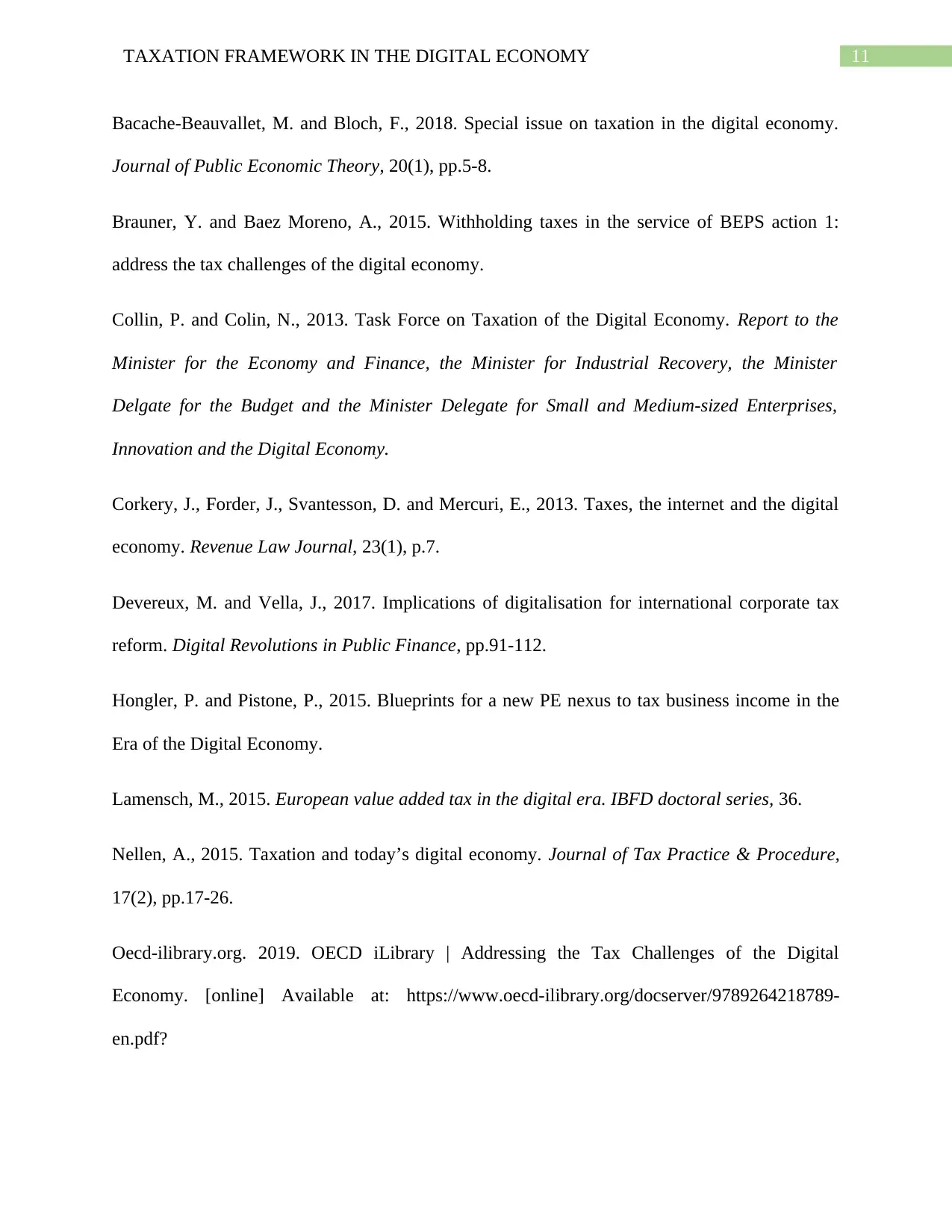
11TAXATION FRAMEWORK IN THE DIGITAL ECONOMY
Bacache‐Beauvallet, M. and Bloch, F., 2018. Special issue on taxation in the digital economy.
Journal of Public Economic Theory, 20(1), pp.5-8.
Brauner, Y. and Baez Moreno, A., 2015. Withholding taxes in the service of BEPS action 1:
address the tax challenges of the digital economy.
Collin, P. and Colin, N., 2013. Task Force on Taxation of the Digital Economy. Report to the
Minister for the Economy and Finance, the Minister for Industrial Recovery, the Minister
Delgate for the Budget and the Minister Delegate for Small and Medium-sized Enterprises,
Innovation and the Digital Economy.
Corkery, J., Forder, J., Svantesson, D. and Mercuri, E., 2013. Taxes, the internet and the digital
economy. Revenue Law Journal, 23(1), p.7.
Devereux, M. and Vella, J., 2017. Implications of digitalisation for international corporate tax
reform. Digital Revolutions in Public Finance, pp.91-112.
Hongler, P. and Pistone, P., 2015. Blueprints for a new PE nexus to tax business income in the
Era of the Digital Economy.
Lamensch, M., 2015. European value added tax in the digital era. IBFD doctoral series, 36.
Nellen, A., 2015. Taxation and today’s digital economy. Journal of Tax Practice & Procedure,
17(2), pp.17-26.
Oecd-ilibrary.org. 2019. OECD iLibrary | Addressing the Tax Challenges of the Digital
Economy. [online] Available at: https://www.oecd-ilibrary.org/docserver/9789264218789-
en.pdf?
Bacache‐Beauvallet, M. and Bloch, F., 2018. Special issue on taxation in the digital economy.
Journal of Public Economic Theory, 20(1), pp.5-8.
Brauner, Y. and Baez Moreno, A., 2015. Withholding taxes in the service of BEPS action 1:
address the tax challenges of the digital economy.
Collin, P. and Colin, N., 2013. Task Force on Taxation of the Digital Economy. Report to the
Minister for the Economy and Finance, the Minister for Industrial Recovery, the Minister
Delgate for the Budget and the Minister Delegate for Small and Medium-sized Enterprises,
Innovation and the Digital Economy.
Corkery, J., Forder, J., Svantesson, D. and Mercuri, E., 2013. Taxes, the internet and the digital
economy. Revenue Law Journal, 23(1), p.7.
Devereux, M. and Vella, J., 2017. Implications of digitalisation for international corporate tax
reform. Digital Revolutions in Public Finance, pp.91-112.
Hongler, P. and Pistone, P., 2015. Blueprints for a new PE nexus to tax business income in the
Era of the Digital Economy.
Lamensch, M., 2015. European value added tax in the digital era. IBFD doctoral series, 36.
Nellen, A., 2015. Taxation and today’s digital economy. Journal of Tax Practice & Procedure,
17(2), pp.17-26.
Oecd-ilibrary.org. 2019. OECD iLibrary | Addressing the Tax Challenges of the Digital
Economy. [online] Available at: https://www.oecd-ilibrary.org/docserver/9789264218789-
en.pdf?
⊘ This is a preview!⊘
Do you want full access?
Subscribe today to unlock all pages.

Trusted by 1+ million students worldwide
1 out of 13
Related Documents
Your All-in-One AI-Powered Toolkit for Academic Success.
+13062052269
info@desklib.com
Available 24*7 on WhatsApp / Email
![[object Object]](/_next/static/media/star-bottom.7253800d.svg)
Unlock your academic potential
Copyright © 2020–2025 A2Z Services. All Rights Reserved. Developed and managed by ZUCOL.




